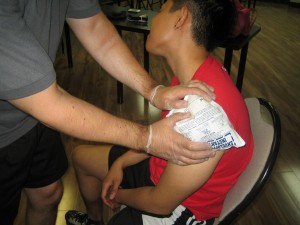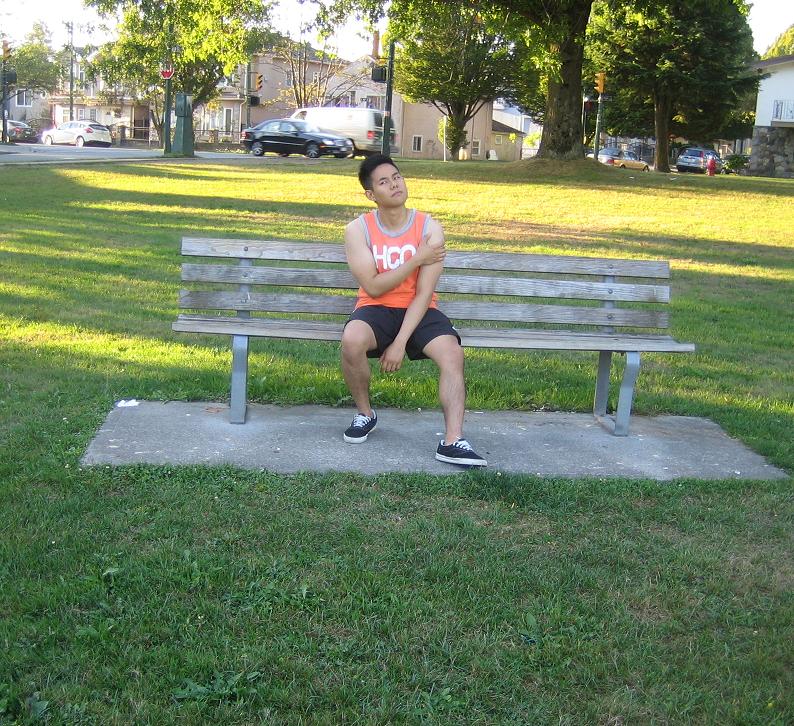Frozen shoulder happens when ligaments around the shoulder joint swell and become stiff. It is characterized by difficulty in moving the shoulder and regular activities such as getting dressed or reaching for something overhead becomes painful.
Over time, the stiffness of the joint continues and the range of motion becomes severely limited. Diabetic people are susceptible to this condition and those with stroke, surgery, overactive or under-active thyroid and heart diseases. Without treatment, the symptoms disappear but it can take 2-3 years.
Symptoms of frozen shoulder
- The freezing phase usually last for 2-9 months. It is characterized by pain, stiffness and limited movement. Pain becomes severe at night when lying down on the affected area.

The freezing phase usually last for 2-9 months. It is characterized by pain, stiffness and limited movement. Pain becomes severe at night when lying down on the affected area. - The frozen phase usually last for 4-12 months. Pain gradually becomes lessened but stiffness and limitation in movement remains and becomes worse. All movements of shoulder are affected especially when rotating the arm in outward direction.
- The thawing phase or recovery phase. This lasts between 1-3 years. Pain and stiffness disappears and movement of the affected area gradually returns to normal or near normal.
- Difficulty in doing regular every task such as dressing, sleeping and driving.
Causes
- Not using the joint due to pain, injury or chronic health conditions such as stroke or diabetes
- Performing activities that requires rotation of the arm such as throwing a ball overarm, swimming freestyle, overhead lifting and stress to the muscles of the shoulder due to injury.
- People ages 40 -70 years old, women in postmenopausal phase and with chronic diseases are susceptible to frozen shoulder.
Treatment
- Perform gentle movements to lessen the symptoms of frozen shoulder.
- Massage the affected shoulder, arm and neck. Massage increases the blood circulation in the area.
- Apply a warm compress on the affected area to lessen the pain, promote proper flow of blood in the area and fast healing of the area. Another alternative is using warm or cold therapy alternately. Wrap an ice pack in a towel before placing on the area to prevent further damage and worsen the condition.
- Take the prescribed anti-inflammatory and pain medications such as paracetamol, ibuprofen and naproxen to lessen the pain and inflammation.
- Perform regularly gentle exercises to prevent and reverse stiffness in the affected shoulder.
- In the early stages of frozen shoulder, maintain good posture to prevent worsening of the condition. Sit in good position especially when working at a desk, watching TV or reading.
- When sleeping, place a pillow in the head and another pillow between the elbow and the body or on the affected side so the arm is slightly away from the body.
- Seek the help of the physical therapist for some rehabilitation exercises to restore the mobility and flexibility of the area without straining the affected shoulder.
More Information
The details posted on this page on frozen shoulder is for learning purposes only. To learn to recognize and manage joint conditions, enroll in a first aid course with one of our training providers.
FACT CHECK
https://www.medicalnewstoday.com/articles/166186.php
https://orthoinfo.aaos.org/en/diseases–conditions/frozen-shoulder/
https://www.mayoclinic.org/diseases-conditions/frozen-shoulder/symptoms-causes/syc-20372684
